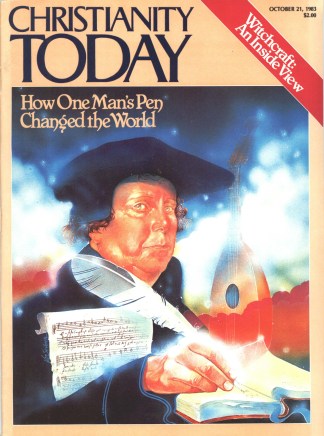Christians who made an impact on society were of a radically different stripe.1Mr. Tarr is a free-lance writer in Scarborough, Ontario, Canada.
Evangelical and fundamentalist spokesmen are speaking out with increasing frequency on social and political issues. If those pronouncements reflected a clearly biblical perspective, one would welcome the development as being long overdue. But it is to be feared that many of those statements are merely echoes of social Darwinism or the platform of the Libertarian party.
The television and radio preachers and writers who make those political statements usually deliver them with the same note of finality and dogmatism with which they appropriately affirm the deity of Christ or the authority of Scripture. Most viewers or readers probably assume that the social or political pronouncement was the only possible Christian perspective on the particular issue.
Some electronic evangelists, for instance, devote a good deal of time to promoting free enterprise and attacking what they define as liberalism and socialism. In that regard they may lambast antipoverty and school lunch programs, Medicare, social welfare, and overseas aid. The basic objection seems to be that such government-sponsored initiatives interfere with a free market, laissez-faire system, reward the undeserving and nonproductive, and restrict and penalize the industrious.
The type of laissez-faire free enterprise that is being advocated by most of these evangelical commentators is found nowhere on the face of the earth in pure form. They imply that American politicians of both parties have for years flirted with and embraced a sinister liberalism and leaned toward socialism. Social welfare programs and environmental regulations are frequent objects of wrath.
The basic thesis seems to be that government has interfered with the functioning of business and industry and has intruded unnecessarily into the lives of all citizens.
That viewpoint is known as social Darwinism. At the same time that Charles Darwin proposed the theory of evolution to explain the origin and development of species, Herbert Spencer contended that evolutionary insights—the law of the jungle and the survival of the fittest—were applicable in the social and economic realm. Thus business should be permitted to operate with little or no restriction from government. In that process the strong would survive and grow, and the weak would be eliminated.
The captains of industry welcomed Spencer’s views. His visit to America was a triumph. Preachers such as Henry Ward Beecher became enthusiastic boosters of social Darwinism.
Those who advocated such views opposed the emerging labor movement because it interfered with free, unfettered competition. In addition, of course, they opposed regulations to restrict hours of work, improve working conditions, or break up monopolies.
It is ironic that the same people who today vehemently oppose biological Darwinism are the enthusiastic advocates of social Darwinism!
William Jennings Bryan, the hero of fundamentalists, was more consistent. He was the outspoken critic of both, and contended that Darwinism in all its expressions cheapened life.
The Libertarian party philosophy is reflected today in the writings of Robert Ringer. According to Ringer, the functions of government are very limited: “1. Providing physical protection for the lives and property of citizens; 2. Providing a system of arbitration for contractual disputes; 3. Providing for a so-called national defense” (Restoring the American Dream). He condemns “the gourmet banquet”: social security, unemployment compensation, minimum wage laws, and such government regulatory agencies as the Food and Drug Administration. I find it alarming that such a philosophy is reflected, although in a more palatable form, in the utterances of Christian social commentators.
In a free society it is to be expected that everyone, including Christians, will espouse differing ideological and political viewpoints. Indeed, diversity contributes to vitality. But when one viewpoint is advanced as the Christian social and political position, we have cause to be alarmed, especially when that position appears to reflect the law of the jungle and the survival of the fittest.
Furthermore, I shudder when I hear its advocates sneeringly refer to “do-gooders” and “bleeding hearts.” Are we to conclude that the ideal is “nature red in tooth and claw” and that compassion and mercy are reluctant concessions to the weak and disadvantaged?
Christians who have made an impact on society have been of a radically different stripe. William Wilberforce, John Howard, Elizabeth Fry, and the Earl of Shaftesbury, for instance, maintained a dynamic Christian presence in and through government and countered the same callousness that seems to be promoted by these contemporary advocates of a baptized version of social Darwinism and Libertarianism. Slaves, chimney sweeps, prisoners, industrial workers, slum dwellers, and the disadvantaged heard the gospel from their lips and saw it demonstrated in their public policies.
If these electronic evangelists succeed in identifying their macho, swashbuckling version of laissez-faire capitalism with the gospel, not only will many people regard Christians as callous social obscurantists, but non-Christians will reject a religion that seems to spawn insensitivity.
Mr. Tarr is a free-lance writer in Scarborough, Ontario, Canada.










